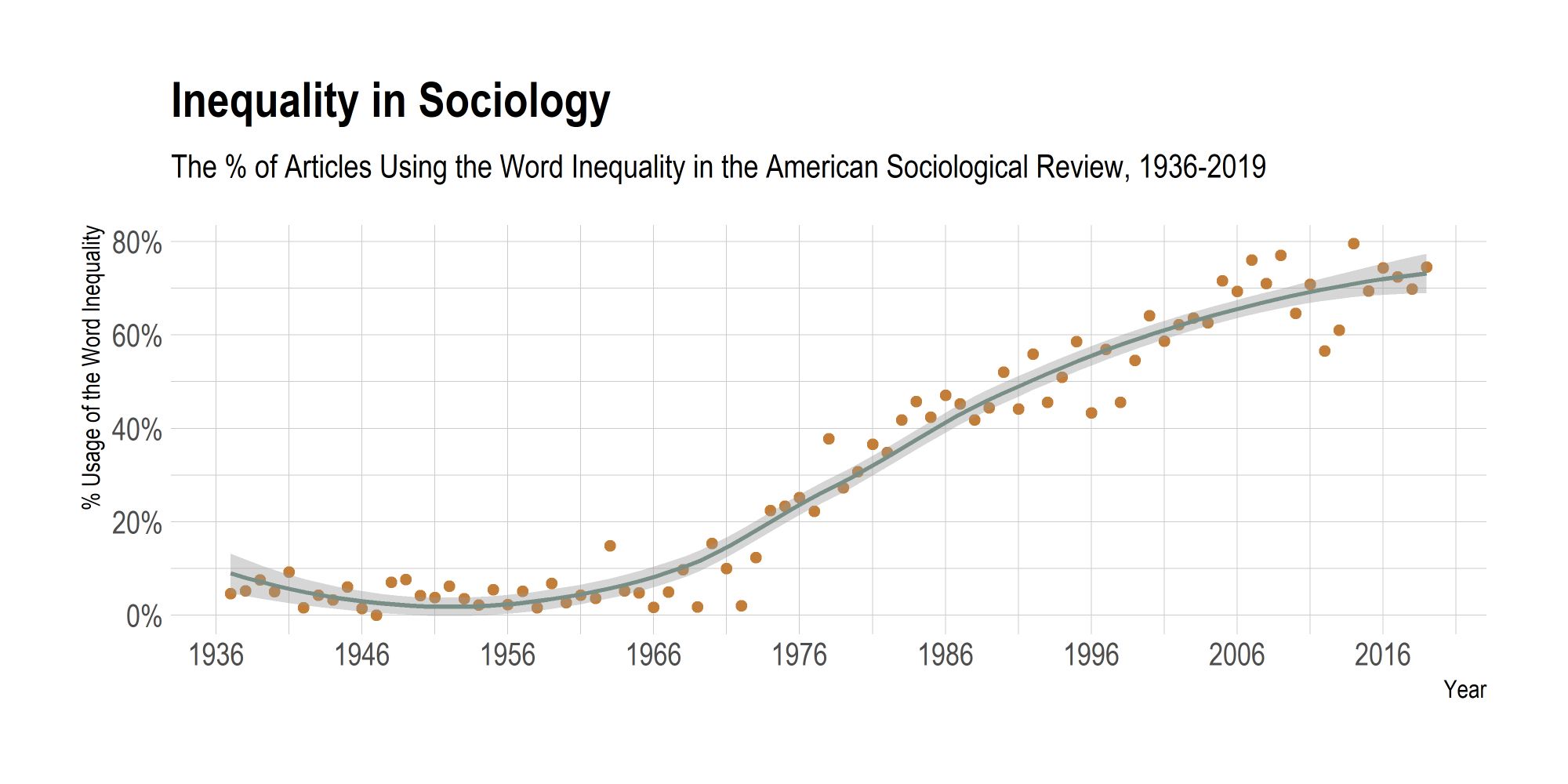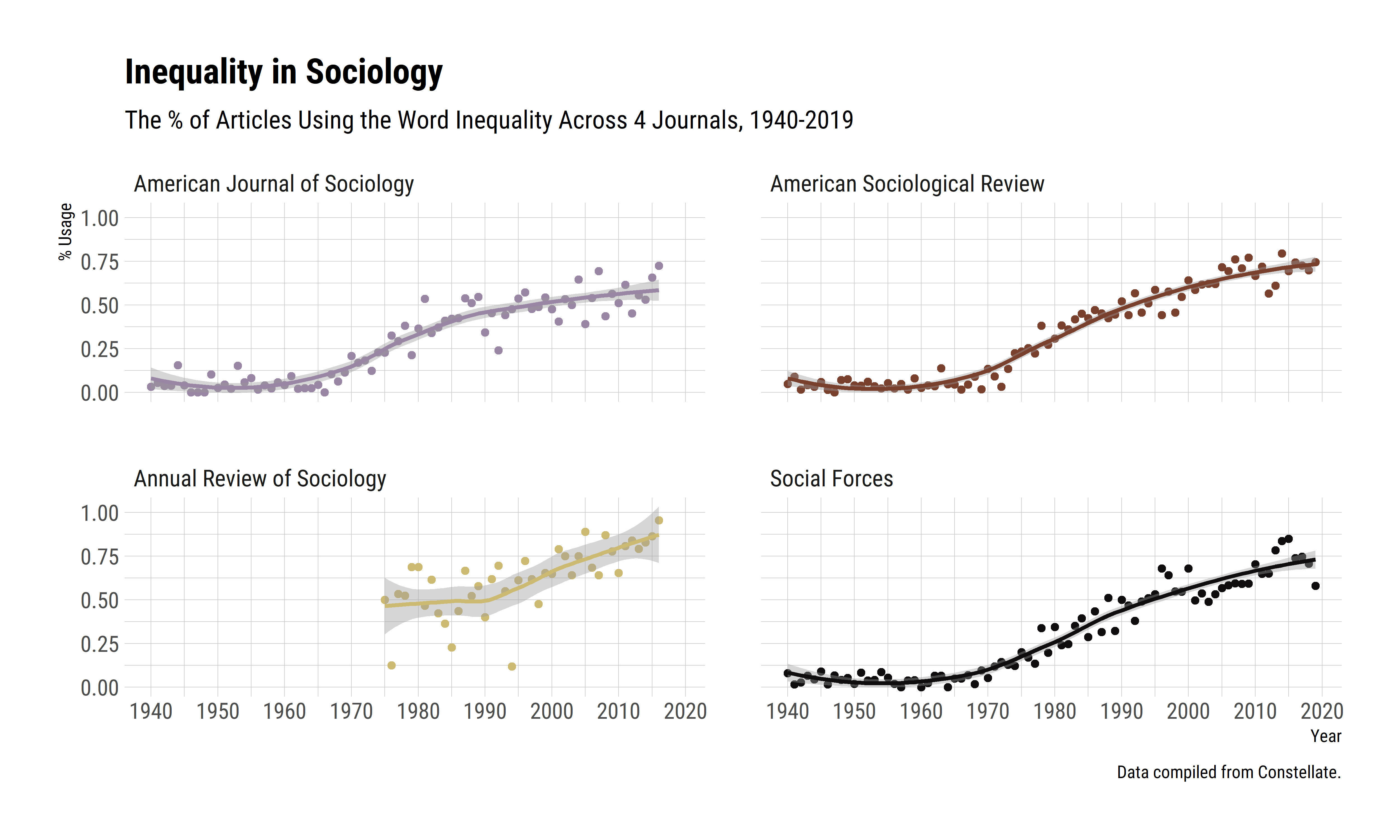Sociology’s Inequality Problem
A few months ago Beth Popp Berman posted a tweet, saying “I love you, sociologists, but do all of us have to work on inequality?”
This generated a plethora of responses from sociologists on Twitter, some arguing that inequality defines the subject-matter of sociology (much like “markets” in economics), while others emphasizing the pervasive feeling that inequality per se has become the topic of sociology, broadly construed. Going forward, one particularly interesting response stated that “a prof once told me that if I want to publish in a top sociology journal, I need to emphasize how a social process I have identified in my research perpetuates or exacerbates inequality.”
I wondered if this was indeed the case, and compiled all the articles published in the American Sociological Review (ASR) between 1936 and 2019 from the Constellate, and counted the number of articles that include the words “inequality” or “inequalities” anywhere in the manuscript.1
1 This is, admittedly, very “broad,” though if the sentiment is correct, mentioning inequality is—in itself—a signal.
The Trajectory of Inequality Research in US Sociology
Figure below shows the results from this exercise.
 |
|---|
| Figure 1 : Inequality in American Sociological Review |
It is fair to say that something happened in sociology over these last few decades.
Nearly 4 out of 5 articles recently published in the ASR mentioned inequality in one form or another.
If we make a dubious assumption that ASR represents the core output of the discipline, these trends mean that the overwhelming majority of sociologists talks about inequality.
Update, July 2024. I also generated a better quality version of the first figure, including data from American Journal of Sociology, Annual Review of Sociology, and Social Forces, with a more in-depth quality control for the article counts.
 |
|---|
| Figure 2: Inequality in Top Sociology Journals |
This echoes an ethos in our professional culture as well, a simple example of which is the conference themes of the American Sociological Association within the last few years, reproduced below:
- 2023: The Educative Power of Sociology,
- 2022: Bureaucracies of Displacement,
- 2021: Emancipatory Sociology: Rising to the Du Boisian Challenge,
- 2020: Power, Inequality, and Resistance at Work,
- 2019: Engaging Social Justice for A Better World,
- 2018: Feeling Race: An Invitation to Explore Racialized Emotions,
- 2017: The Culture, Inequalities, and Social Inclusion Across Globe,
- 2016: Rethinking Social Movements: Can Changing the Conversation Change the World,
- 2015: Sexualities in the Social World,
- 2014: Hard Times: The Impact of Economic Inequality on Families and Individuals,
- 2013: Interrogating Inequality: Linking Micro and Macro.
Again, our disciplinary discussions revolve around inequality, in one form or another.
The Problem of What?
This is perhaps not surprising. Given that there are massive inequalities across class, race, and gender, it would be unexpected not to talk about inequality. That said, it is hard to overlook the fact that the majority of research output might be localizing in this area, too. If there is indeed a trend to inequality research as a “field-defining” phenomenon, this should have certain consequences for the long-term evolution of sociology.
I say “long-term evolution,” because the evidence suggests that
“students [in U.S. sociology] were most likely to achieve influential field positions when they target certain topics reflective of the cultural turn.”
This basically means—economics alert—there are incentives at play.
It is fair to say that sociology has already a reputation, especially in the U.S., for being particularly attuned to the study of inequality. If there is indeed a strong clustering around inequality research as well, this might mean that the disciplinary socialization of the new generations of sociologists will find inequality as the “principal” research agenda of the field—that is, if this is not already happening. This means that, to put it bluntly, sociology can become inequality studies.
This has strong implications on what sociological theory is, what we mean when we say something is sociological, and what the long-term outlook of our field is. This deserves a discussion.